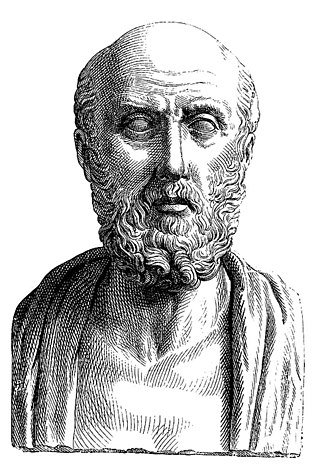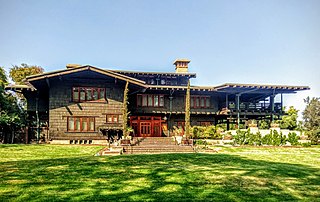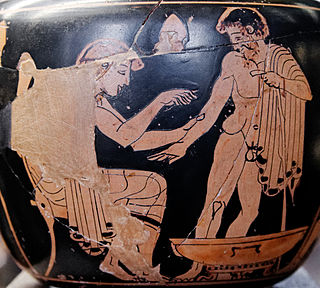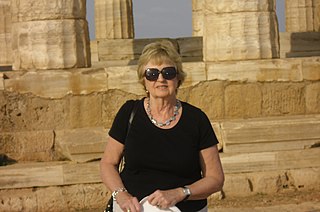
Hippocrates of Kos, also known as Hippocrates II, was a Greek physician of the classical period who is considered one of the most outstanding figures in the history of medicine. He is traditionally referred to as the "Father of Medicine" in recognition of his lasting contributions to the field, such as the use of prognosis and clinical observation, the systematic categorization of diseases, or the formulation of humoral theory. The Hippocratic school of medicine revolutionized ancient Greek medicine, establishing it as a discipline distinct from other fields with which it had traditionally been associated, thus establishing medicine as a profession.

A woman is an adult female human. Before adulthood, a woman is referred to as a girl.

The Hippocratic Oath is an oath of ethics historically taken by physicians. It is one of the most widely known of Greek medical texts. In its original form, it requires a new physician to swear, by a number of healing gods, to uphold specific ethical standards. The oath is the earliest expression of medical ethics in the Western world, establishing several principles of medical ethics which remain of paramount significance today. These include the principles of medical confidentiality and non-maleficence. As the seminal articulation of certain principles that continue to guide and inform medical practice, the ancient text is of more than historic and symbolic value. It is enshrined in the legal statutes of various jurisdictions, such that violations of the oath may carry criminal or other liability beyond the oath's symbolic nature.

Pedanius Dioscorides, "the father of pharmacognosy", was a Greek physician, pharmacologist, botanist, and author of De materia medica —a 5-volume Greek encyclopedia about herbal medicine and related medicinal substances, that was widely read for more than 1,500 years. For almost two millennia Dioscorides was regarded as the most prominent writer on plants and plant drugs.

Traditional medicine comprises medical aspects of traditional knowledge that developed over generations within the folk beliefs of various societies, including indigenous peoples, before the era of modern medicine. The World Health Organization (WHO) defines traditional medicine as "the sum total of the knowledge, skills, and practices based on the theories, beliefs, and experiences indigenous to different cultures, whether explicable or not, used in the maintenance of health as well as in the prevention, diagnosis, improvement and treatment of physical and mental illness". Traditional medicine is often contrasted with scientific medicine.

The Gamble House, also known as the David B. Gamble House, is an iconic American Craftsman home in Pasadena, California, designed by the architectural firm Greene and Greene. Constructed in 1908–1909 as a home for David B. Gamble, son of the Procter & Gamble founder James Gamble, it is today a National Historic Landmark, a California Historical Landmark, and open to the public for tours and events.

Helen King is a British classical scholar and advocate for the medical humanities. She is Professor Emerita of Classical Studies at the Open University. She was previously Professor of the History of Classical Medicine and Head of the Department of Classics at the University of Reading.

Ancient Greek medicine was a compilation of theories and practices that were constantly expanding through new ideologies and trials. The Greek term for medicine was iatrikē. Many components were considered in ancient Greek medicine, intertwining the spiritual with the physical. Specifically, the ancient Greeks believed health was affected by the humors, geographic location, social class, diet, trauma, beliefs, and mindset. Early on the ancient Greeks believed that illnesses were "divine punishments" and that healing was a "gift from the Gods". As trials continued wherein theories were tested against symptoms and results, the pure spiritual beliefs regarding "punishments" and "gifts" were replaced with a foundation based in the physical, i.e., cause and effect.

Dame Averil Millicent Cameron, often cited as A. M. Cameron, is a British historian. She writes on Late Antiquity, Classics, and Byzantine Studies. She was Professor of Late Antique and Byzantine History at the University of Oxford, and the Warden of Keble College, Oxford, between 1994 and 2010.

Medicine in ancient Rome was highly influenced by ancient Greek medicine, but also developed new practices through knowledge of the Hippocratic Corpus combined with use of the treatment of diet, regimen, along with surgical procedures. This was most notably seen through the works of two of the prominent Greek physicians, Dioscorides and Galen, who practiced medicine and recorded their discoveries. This is contrary to two other physicians like Soranus of Ephesus and Asclepiades of Bithynia, who practiced medicine both in outside territories and in ancient Roman territory, subsequently. Dioscorides was a Roman army physician, Soranus was a representative for the Methodic school of medicine, Galen performed public demonstrations, and Asclepiades was a leading Roman physician. These four physicians all had knowledge of medicine, ailments, and treatments that were healing, long lasting and influential to human history.
The relationship between transgender people and religion varies widely around the world. Religions range from condemning any gender variance to honoring transgender people as religious leaders. Views within a single religion can vary considerably, as can views between different faiths.

Amélie Kuhrt FBA was a British historian and specialist in the history of the ancient Near East.

Alain Touwaide is a US historian of medicine and sciences of Belgian origin. He taught history of Greek medicine and its tradition, Food history and other topics in the Medical Humanities at the University of California Los Angeles (UCLA), during the academic years 2015-2016, 2016-2017, 2017-2018, 2018-2019.
William Vernon Harris was the William R. Shepherd Professor of History at Columbia University until December 2017. He is the author of numerous groundbreaking monographs on the Greco-Roman world, he is a Fellow of the American Academy of Arts & Sciences, and he was awarded the Distinguished Achievement Award by the Andrew W. Mellon Foundation in 2008.
Christian denominations have a variety of beliefs about sexual orientation, including beliefs about same-sex sexual practices and asexuality. Denominations differ in the way they treat lesbian, bisexual, and gay people; variously, such people may be barred from membership, accepted as laity, or ordained as clergy, depending on the denomination. As asexuality is relatively new to public discourse, few Christian denominations discuss it. Asexuality may be considered the lack of a sexual orientation, or one of the four variations thereof, alongside heterosexuality, homosexuality, bisexuality, and pansexuality.
This article details the history of cross-dressing, the act of wearing the clothes of the sex or gender one does not identify with.

The Catholic Church is the largest non-government provider of health care services in the world. It has around 18,000 clinics, 16,000 homes for the elderly and those with special needs, and 5,500 hospitals, with 65 percent of them located in developing countries. In 2010, the Church's Pontifical Council for the Pastoral Care of Health Care Workers said that the Church manages 26% of the world's health care facilities. The Church's involvement in health care has ancient origins.

Meredith J. C. Warren is a Senior Lecturer in Biblical and Religious Studies at the University of Sheffield. She is known for her views on the New Testament and early Judaism as well as for her media appearances for such outlets as The Washington Post, and BBC radio. She is a Metis citizen of the Manitoba Metis Federation.
Heidi Marx is a Professor of Religion at the University of Manitoba in Winnipeg, Canada. Since July 2016, Marx has served as an Associate Dean in the Faculty of Arts. She is currently the Associate Dean of Undergraduate Studies, but has also filled two other portfolios.
Ancient Romans with disabilities were recorded in the personal, medical, and legal writing of the period. While some disabled people were sought as slaves, others with disabilities that are now recognized by modern medicine were not considered disabled. Some disabilities were deemed more acceptable than others, either as honorable characteristics or as traits that increased morality. Small, scattered medical references contain the only direct acknowledgments of disability.













